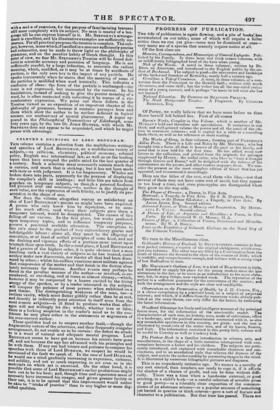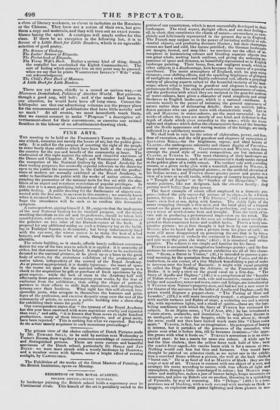We turn to the Miscellaneous class.
Goldsmith's History of England, by Bri.t.eltsmucas, contains in four neat pocket Volumes, a reprint of the original abridgment, which occu- pies two volumes. The other two are filled by a Continuation from the death of GEORGE the Second to the close of the session of 1836; which is readable, and comprehensive enough, and written with a strong tinge of low Radicalism in tone.
Mr. MAUGHAM'S Outlines of Law, is a kind of BLACKSTONE in little, and intended to supply his place for the young student since the late alterations in the law, or to serve as an introduction to his more elabo- rate, hut, in many things, now exploded work. The reputation of the author is a sufficient guarantee for the correctness of the matter ; and both the arrangement and the style are clear and intelligible.
Observations on the Preservation of Health, by J. II. CURTIS, Esq., is a clever compilation by a practised hand, on a subject of perpetual interest ; and which, if it differs from the numerous works already pub- lished on the same theme, can only differ for the better, by embracing the latest information.
Woodland Gleanings is a lively and intelligent account of the principal forest trees, for the information of the unscientific reader. The characteristics of each tree, its history, uses, mode of cultivation, effect in a landscape, and the poetical associations connected with it, as also any remarkable specimens in this country, are given: and the text is illustrated by wood-cuts of the entire tree, and of its leaves, flowers, and fruit. The information contained in this pretty little volume will be useful to Country as well as Cockney foik.
The Parlour Book is a familiar introduction to science, arts, and manufactures, in the shape of a little narrative interspersed with con- versations between a father and his children. The subjects are perti- nently introduced, and explained with remarkable clearness and suc- cinctness, and in an anecdotical style that relieves the dryness of the subject, and assists the understanding by presenting images to the mind. It is illustrated by numerous lithographic pictures and diagrams.
This is ar. impudently imitative age. Na sooner is a novelty of any sort started, than numbers are ready to copy it, if it affords the shadow of a chance of profit, and can be done without diffi- culty. There was a time when a handsome external, or good printing, in a child's book—or a careful selection of sensible prose or good poetry—or a tolerably clear exposition of the common- places of an abstruser science—or a popular account of something yet buried in quartos or thick octavos—gave a sort of feature and character to a publication. But that time has passed. There are a class of literary workmen, as clever in imitation as the Russians or the Chinese. They have not a notion of their own, but give them a copy and materials, and they will turn out an exact resem- blance bating the spirit. A catalogue will amply suffice fur this class. if there be an exception in the following list, it is in favour of a Little Book for Little Readers, which is an agreeable selection of good poetry.
The Science of Geology.
The Ladies' Science of Etiquette.
The Pocket-book of Etiquette.
The Young Wife's Book. Rather a serious kind of thing, though the compiler has overlooked the Eighth Commandment. The sort of feeling which animates him on this point may be guessed, when we say that he prints WASHINGTON IRVING'S " Wife " with- out acknowledgment.
The Child's First Book of Manners. A Little Book for Little Readers.



























 Previous page
Previous page